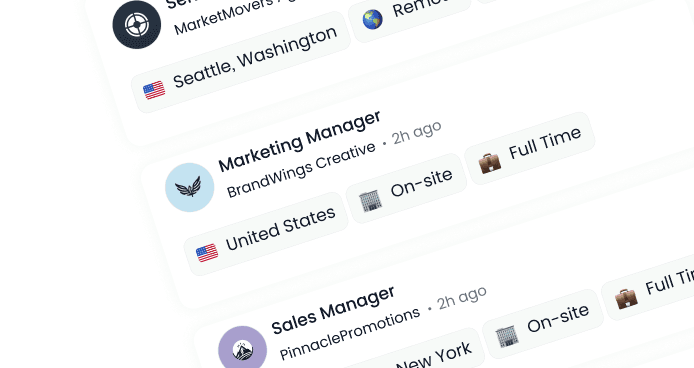Building Skills-Based Teams Through AI Job Boards
Published:
November 26, 2025
All
AI Recruitment
Recruiting Tips
Employer Branding
Candidate Experience
Workforce Planning
Stop hiring by titles — start building teams by skills. AI makes it faster, smarter, and fairer.
AI job boards are transforming hiring from resume-based guesswork to skills-driven precision. By focusing on what candidates can do rather than where they’ve been, employers can build diverse, future-ready teams that keep pace with rapid industry change, and platforms like DigitalHire make that transition faster, smarter, and more human.
There’s a big shift happening in how companies hire, and it’s not about where people went to school anymore. It’s about what they can do. The move from degree-based to skills-based hiring is reshaping the way teams are built, especially in industries evolving at lightning speed like tech, digital marketing, and SaaS.
But here’s the challenge: Identifying real skills in a sea of resumes isn’t easy. Traditional job boards and manual screening can’t always tell who’s capable versus who just looks good on paper. That’s where AI job boards are changing the game. They’re helping recruiters look beyond titles and degrees, and actually find people who can perform, adapt, and grow.
Let’s break down how AI is making skills-first hiring not just possible, but smarter, faster, and fairer.
Why the Future of Hiring is Skills-Based
Skills-based hiring is about evaluating what candidates can do today, not what they studied years ago. As automation, digital transformation, and AI reshape entire industries, employers can’t rely solely on academic credentials to predict job performance.
According to Deloitte, companies prioritizing skills-based hiring are 63% more likely to achieve higher productivity and 52% more likely to innovate than those sticking to traditional models. The reason is simple, when you hire for skills, you hire for agility.
And agility is what every fast-changing business needs right now.
A skills-first hiring model allows you to:
Tap into diverse talent pools that traditional hiring overlooks.
Match people to work that fits their actual abilities, not just their job titles.
Build teams that learn and adapt faster, ready to meet new business challenges.
But identifying skills accurately, at scale, is the hard part. That’s where AI steps in.
The Role of AI Job Boards in Building Skills-Based Teams
Traditional job boards rely heavily on keywords and job titles. AI-powered platforms go deeper. They scan through candidate profiles, portfolios, and even online activities to validate real-world skills and experience.
Here’s how AI job boards make the transition to skills-first hiring seamless:
Smart Skill Mapping: AI algorithms analyze resumes, LinkedIn profiles, and portfolios to detect core skills, even when they’re worded differently.
Validated Skill Assessments: Integrated skill tests or project simulations help confirm actual ability, not just claimed experience.
Precision Matching: Instead of keyword matching, AI uses semantic understanding to match candidates to roles based on verified skills, industry context, and potential.
Bias Reduction: By focusing on abilities and outcomes, AI helps reduce bias linked to universities, degrees, or demographics, making hiring more inclusive.
This approach doesn’t just help recruiters find better fits. It creates fairer opportunities for self-taught developers, career changers, and professionals with non-traditional paths.
Making Talent Acquisition Smarter and More Efficient
Building skills-based teams isn’t just about fairness, it’s also about recruitment efficiency.
AI job boards eliminate repetitive tasks like manual screening or sorting through hundreds of unqualified applications. Instead, they automatically rank candidates by skill relevance, experience depth, and performance potential.
For HR leaders, this means faster hiring cycles and better decision-making. For job seekers, it means a more transparent, skill-focused process where they’re valued for what they know, not where they came from.
That’s the foundation of a modern talent acquisition strategy, one powered by data, not assumptions.
The Early Adoption Advantage
Here’s the thing: AI-driven, skills-first hiring isn’t a futuristic idea. It’s happening now, and early adopters are already reaping the benefits.
Companies integrating AI job boards into their hiring stack are:
Filling positions 30–40% faster
Reducing turnover by hiring for skill alignment and growth potential
Enhancing collaboration by matching complementary skill sets across teams
The early adoption advantage goes beyond speed, it builds stronger, more adaptable teams ready to pivot with industry changes.
If you’re still relying on traditional job descriptions and keyword filtering, you’re likely missing out on exceptional talent that simply doesn’t fit a conventional mold.
Building Employer Branding Around Skills
Your hiring strategy says a lot about your company’s culture. A skills-first approach tells candidates that you value ability, growth, and inclusion.
AI job boards support this by providing personalized candidate experiences, automated updates, clear feedback loops, and transparent skill validation processes. Over time, this builds trust and strengthens your employer brand.
Top talent today isn’t just looking for a paycheck. They’re looking for workplaces that value continuous learning and fair evaluation. And that’s exactly what skills-based hiring represents.
Tips for Transitioning to Skills-Based Hiring
If you’re ready to embrace skills-first recruitment, start small but think big:
Audit your job descriptions. Remove degree requirements unless absolutely necessary. Focus on deliverables and measurable outcomes.
Adopt AI job boards early. Platforms like DigitalHire use advanced matching systems to connect you with candidates who fit by skills and potential.
Integrate skill assessments. Use data-driven tests or simulations to validate what candidates can actually do.
Track and refine. Use analytics to see which skills lead to long-term success—and adjust your strategy accordingly.
Bringing It All Together
The shift from degrees to skills isn’t just a hiring trend; it’s a business transformation. As industries evolve, the ability to identify and mobilize skill-based talent will define who stays competitive and who falls behind.
AI job boards give HR leaders the visibility, speed, and precision they need to build agile, future-ready teams. By aligning talent acquisition with real capabilities, you’re not only filling roles faster, you’re building a stronger, more resilient organization.
So, if you’re ready to evolve your hiring strategy and focus on what truly drives success, it’s time to take action. With DigitalHire, you can identify, validate, and match top talent based on skills, not just resumes. Whether you’re scaling a tech startup or evolving a global enterprise, our AI-powered platform helps you build teams that are future-ready, diverse, and competitive.
Start hiring for skills, not just resumes and discover how DigitalHire helps you build skills-first teams.
FAQs
What does skills-based hiring mean in practice?
It means evaluating candidates based on their proven abilities and technical skills, rather than relying on degrees or previous job titles.How do AI job boards identify real skills?
AI platforms like DigitalHire use natural language processing and integrated skill assessments to validate a candidate’s actual abilities and experience.
Does this approach help reduce bias?
Yes. Since AI focuses on skill relevance instead of demographics or educational background, it helps minimize unconscious bias in early-stage screening.
Why is skills-based hiring essential for remote or hybrid teams?
When teams are distributed, outcomes matter more than credentials. Hiring for skills ensures every team member contributes effectively, no matter where they’re located.
How can employers get started with skills-first hiring?
Begin by using AI tools that analyze, assess, and match candidates based on abilities, not titles. Platforms like DigitalHire make this transition seamless for modern employers.
FREE JOB POST
Looking to fill a position quickly? Post your job for free and reach top talent today!




